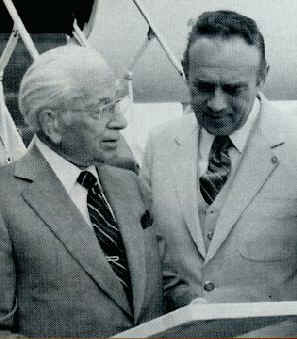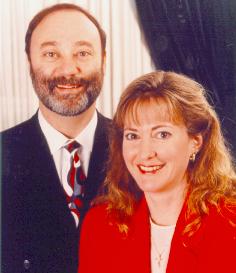GCI: Where We Have Been; Where We Are Going
Christ-centered life, based on the Bible, is our legacy and our future.
We press forward, motivated by our upward call in Christ.
We base our faith and our way of life on the Bible. We look to the Holy Spirit to continue to lead us and transform us to become more like Christ. That’s our summary of where we have come from and where we are going spiritually.
Although our spiritual roots are in the New Testament people of God, our more recent historical roots are in 19th-century North America. Preachers from various denominations advocated a restoration of biblical Christianity.
Predictions about the second coming of Jesus Christ were widespread. Some believed that he would return in 1844. Despite the Great Disappointment that resulted when Christ did not return as expected, interest in the Bible continued to be high. Groups began to form.
One of those groups stimulated Herbert Armstrong to begin his biblical studies in 1926. His newfound zeal for the Bible motivated him to teach others and to begin an evangelistic ministry, which eventually became a denomination.
After he gave a series of public Bible lectures in Eugene, Oregon, a small congregation formed. With its financial support, he soon began preaching on a small radio station. His program created interest and response. Many listeners requested more information, so Mr. Armstrong began a magazine. Their financial support allowed the radio program to expand and for even more people to receive the magazine free of charge.
On radio programs and in public lectures, Mr. Armstrong challenged his audiences to “blow the dust off your Bible” and study it to see “whether those things were so” (Acts 17:11, King James Version). “Don’t believe me,” he often said, “believe the Bible.”
In response to Mr. Armstrong’s enthusiastic preaching, thousands began to study the Bible. They were convinced that the Bible is the authoritative guide to life and faith. It reveals our need for salvation and, through Jesus Christ, God’s answer to our need. The Bible leads us to faith in our Savior and guides us in responding to him.
Congregations form
Thousands began to support Mr. Armstrong’s radio and magazine ministry. They repented and accepted Christ as their Savior, and they asked to be baptized. Local congregations were formed, and pastors were appointed to help these new Christians become more established in the faith. They met each week to worship, learn and encourage each other.
In 1947, a college was formed in Pasadena, California, to train pastors and other church workers. Though the Bible was of primary importance, students were given a four-year liberal-arts curriculum to prepare them for the diverse world in which they were called to serve.
In the 1950s, the radio program continued to expand in North America, then Europe and Australia and Latin America. Baptisms and churches and international offices soon followed. The college also expanded, training more personnel for the growing work. More languages and offices were added in the 1960s.
In the 1970s, growth continued, but at a slower pace, as the church learned important lessons about avoiding predictive prophecies. Christ did not return as soon as expected, but he did lead the church to a deeper understanding of the Bible.
Follow Christ first
Our mistakes with prophecy encourage us to focus on Christ and the Bible, not on human personalities or on doctrines that aren’t actually in the Bible. We follow Christ first, and our human leaders as they follow Christ (1 Corinthians 11:1).
Although our history is important to us, we are a forward-looking church. We do not assume that we have obtained perfection, and we, like Paul, do not glory in our past, no matter how honorable. Instead, we press forward, motivated by our upward call in Jesus Christ (Philippians 3:12-14). We do not want our traditions to blind us to whatever further understanding God may give us.
Jesus Christ is the Head of the church (Colossians 1:18), and he continues to lead us by means of the Bible (2 Timothy 3:16-17) and the Holy Spirit (John 16:13).
 |
 |
Mr. Armstrong died in 1986, and the leadership of the church passed to Joseph W. Tkach (shown above right), who had been an executive assistant to Mr. Armstrong. Under Mr. Tkach’s leadership, the church learned much more from the Bible. Regrettably, many of the members did not accept these biblical teachings, and many of them left the church. When Mr. Tkach died in 1995, leadership passed to his son, Joseph Tkach, who continued to point members to the Bible, to Jesus Christ, and to the work of the Holy Spirit in our lives. In 2018, leadership passed to Greg Williams.
Mr. Armstrong’s greatest legacy is his commitment to live by every word of God – to believe the Bible and faithfully obey its teachings. We diligently uphold that commitment. The Bible is still our ultimate authority in all matters of faith and doctrine.
Church goals
As led by Christ, the church continues in the legacy of Bible-based Christianity. We work to conform to biblical teaching. The Bible continues to challenge us to bring every thought into captivity to Jesus Christ (2 Corinthians 10:5). He is our Lord and our Savior.
The church has goals for itself and for its members. Our collective goal is to preach the gospel of Jesus Christ, to make disciples, to baptize them and to teach them the Christian way of life (Matthew 28:19-20). “The work of God is this,” Jesus said, “to believe in the one he has sent” (John 6:29). Therefore, the work of the church of God is to bring people to Christ, to lead them to faith in our Savior.
As a collective Body, the church preaches the gospel and encourages people to become disciples of Jesus Christ. We welcome others to worship and learn with us. We provide congregations and ministers to facilitate individual growth and to stimulate works of service.
Joseph Tkach set the tone and direction for our denomination as it faces the challenges of the 21st century:
A Christian is a Christlike person. My primary directive for the church is that it fully exemplify the qualities and love of Christ. I want each and every member of the church to be a sincere, serving, humble, loving person whose individual light shines and brings glory to Christ and to the church.
I envision a church that lives up to its calling. I envision a church that lives within its means and communicates effectively to change people’s lives. I also envision local congregations that are actively involved in preaching the gospel, and are not just social clubs.
I envision a church filled with zealous, converted, loving people who actually live the life of Christ, who live the gospel, who love their neighbors and demonstrate it.
“By this all men will know that you are my disciples,” Jesus said, “if you love one another” (John 13:35).
For more about our history, see the article “A Brief History of the Grace Communion International.”
